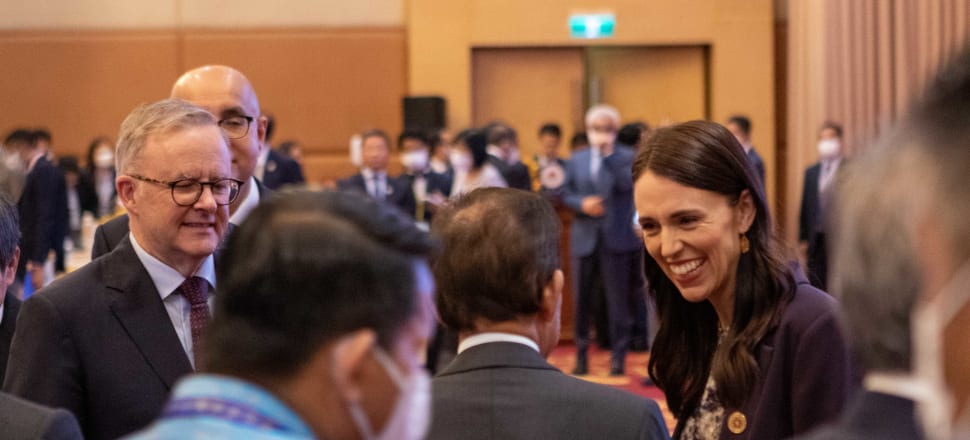
It hasn’t escaped Jacinda Ardern that conflicts and crises the world over have only increased in the years since she began attending global summits. Political editor Jo Moir reports from the East Asia Summit in Cambodia.
Consensus at international forums has increasingly got harder as countries prioritise and protect their own agendas, but the Prime Minister says showing up at the table each year is the ticket to regional stability.
This week Jacinda Ardern found herself harking back to the early 1980s to find a time in New Zealand history when things would have felt as grim as they do now.
It’s revealing that, for the most part, the region has experienced relative peace and stability, yet in the time since Ardern has been Prime Minister tensions in the Indo-Pacific and conflicts internationally have rapidly increased.
In Myanmar, the military deposing an elected civilian government in 2021 has set the country back years. In Ukraine, the invasion by Russia is not only illegal but causing utter devastation and death. And then there’s the geopolitical tensions in the Indo-Pacific that have the region on edge hoping for a solution before any escalation sets in.
Ardern used her intervention speech at the East Asia Summit (EAS) on Sunday to spell out the issues facing the region and call for members of the forum to rethink what the purpose of the EAS is in 2022 and beyond.
Myanmar’s “executions and bombing of civilians”, North Korea’s record number of ballistic missile tests this year, the “increasing militarisation” in the South China Sea, tensions in the Taiwan Strait and the human rights abuses in Xinjiang and Hong Kong painted a grim picture.
“Stains on the region” was just one phrase she used to condemn the many deplorable acts regularly being reported.
Asked whether it was fair to say the world had become a little grimmer each year Ardern had held office, she paused and deeply sighed as if almost exhausted by the scale of the atrocities.
After a moment of reflection, she told Newsroom she didn’t particularly want to put a label on what the past five years might have been for people.
“Because you think back, in my lifetime, at the time we had nuclear weapons being tested in our backyard, apartheid, the world would have felt like a pretty grim place then too.
“The question for me is do we have the right forums, the right leaders and right mobilisation to make change?”
Ardern says it only takes one of those things “to find that stability or that change”.
Ever the optimist, she says she will “never give up on dialogue in these forums to make change.”
There was never a reason to leave the table, especially if it’s only because the going has got tough, Ardern said.
While Myanmar and Russia were the stand-out discussions in Phnom Penh on Sunday, no consensus was reached on how to deal with either.
“Nobody expects to come to the East Asia Summit and suddenly see peace break out between Ukraine and Russia, and nobody expects that suddenly Myanmar will be on a path to democracy." - Jacinda Ardern
In the case of Myanmar, its chair sat empty throughout the EAS after its fellow Asean nations agreed not to allow representation from the military junta at the event for the second year in a row.
Russian President Vladimir Putin sent his foreign minister, Sergei Lavrov, in his place to Cambodia, and China’s Xi Jinping was represented by Prime Minister Li Keqiang.
United States President Joe Biden was in the room – though he was somewhat late to the meeting after the host, Cambodian Prime Minister Hun Sen, started without him.
Biden was busy elsewhere in the building dealing with media, following news the Democrats had won the Senate.
Biden and Xi will both be in the room at the G20 in Bali in coming days but when Ardern meets back up with the two superpowers at APEC in Bangkok later in the week, Biden will have headed home and vice-president Kamala Harris will be in his place.
Given Ardern was the only woman leader there on Sunday and notably younger than all her counterparts, Harris will bolster diversity on both counts.
Consensus was always going to be near impossible at this summit – Ardern had been frank about that heading into it and confirmed the same at its conclusion, describing the day as “deliberate and very sober”.
Resolution at the EAS is a long game, and for that reason a win can be as little as no further deterioration of the stability within the region.
“Nobody expects to come to the East Asia Summit and suddenly see peace break out between Ukraine and Russia, and nobody expects that suddenly Myanmar will be on a path to democracy,” she told media following the meeting.
The point of these summits, she said, was to allow dialogue, and the fact there was consistency found on issues like Myanmar and a willingness to acknowledge the US and China have tensions, meant the entrenchment could at least be slowed.
“This organisation has kept us steady for decades, we need it to keep us steady in the future,” she told media.
In some respects, the EAS was just the warm-up act to APEC, which will be hosted by Thailand later in the week, after G20 countries have first battled it out in Bali.
All eyes will be on the meeting between Biden and Xi in Bali on Monday - the first since Biden became President - as the two leaders prepare to each lay out their positions over Taiwan.








